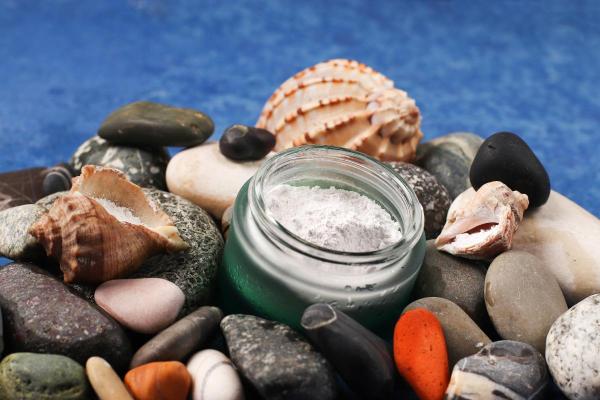What Are the Benefits of Marine Collagen?


Wrinkles, thinning hair, achy joints - these are all unwelcome signs of aging. But what if there was a natural way to fight back? Marine collagen is gaining popularity for its potential to promote youthful skin, luscious hair, and healthy joints. But is the hype real?
In this oneHOWTO article, we explore the benefits of marine collagen, as well as what it is, how it works, and the scientific evidence behind its benefits for your skin, hair, and joints.
What is marine collagen?
Marine collagen is a type of protein predominantly found in the scales, skin, and other parts of fish. It is commonly consumed in its hydrolyzed form, where the collagen is broken down into smaller peptides that are more easily absorbed by the human body.
Marine collagen offers numerous benefits, including promoting skin regeneration, which makes it popular in the cosmetic and aesthetic fields. It is often consumed as a dietary supplement, readily available on the market.
In addition to fish, marine collagen can also be sourced from other marine invertebrates such as jellyfish and sponges. The food industry frequently utilizes parts of fish that are typically discarded, such as the head, spines, and scales, to produce marine collagen.
The process of hydrolysis involves breaking down the collagen into smaller, more digestible molecules, resulting in hydrolyzed marine collagen. This form is widely consumed globally, especially by individuals suffering from arthritis, as it helps in lubricating ligaments and joints.

Properties of marine collagen
Marine collagen is a type of protein predominantly found in the scales, skin, and other parts of fish. It is commonly consumed in its hydrolyzed form, where the collagen is broken down into smaller peptides that are more easily absorbed by the human body.
Marine collagen offers numerous benefits, including promoting skin regeneration, which makes it popular in the cosmetic and aesthetic fields. It is often consumed as a dietary supplement, readily available on the market.
In addition to fish, marine collagen can also be sourced from other marine invertebrates such as jellyfish and sponges. The food industry frequently utilizes parts of fish that are typically discarded, such as the head, spines, and scales, to produce marine collagen.
The process of hydrolysis involves breaking down the collagen into smaller, more digestible molecules, resulting in hydrolyzed marine collagen. This form is widely consumed globally, especially by individuals suffering from arthritis, as it helps in lubricating ligaments and joints.

What is marine collagen for and its benefits?
One of the primary benefits of marine collagen is its ability to enhance skin appearance. As we age, our skin tends to lose elasticity, but marine collagen can help strengthen it, as well as improve the strength of nails and hair.
By ingesting marine collagen, your skin can appear smoother and firmer, reducing the appearance of wrinkles and fine lines. Its notable properties include:
- Helps to repair and rejuvenate the skin
- Provides more elasticity to the skin
- Fights sagging skin, giving it more firmness
- Moisturizes and nourishes the skin
- Strengthens nails and hair
- Delays the signs of aging
- Soothes joint pain
- Increases muscle mas
- Improves cardiovascular health
These benefits are why people often seek marine collagen, not only for aesthetic improvements but also for bone and joint health.

How to consume marine collagen
Marine collagen can be consumed in various ways, with the market offering alternatives such as capsules, powders, and creams. Specialists usually recommend taking collagen in its hydrolyzed form, because it is easier and quicker for the body to assimilate. This hydrolyzed form is available in both capsules and powder.
The typical recommendation is an intake of 10 grams per day. Hydrolyzed marine collagen in powder form dissolves quickly and can be taken at any time of the day. Here are some popular ways to incorporate it into your daily routine:
- Smoothies and shakes: mix marine collagen powder into your favorite smoothie or protein shake. This is particularly beneficial after workouts to aid in muscle recovery and skin regeneration.
- Coffee and beverages: add a scoop of collagen powder to your morning coffee or tea. It dissolves easily without altering the taste significantly, making it a convenient way to boost your collagen intake.
- Water: simply mix the powder into a glass of water. This is a quick and easy method, especially if you're on the go.
In addition to supplements, marine collagen can also be obtained by consuming fish. Here are some fish-rich meals that naturally boost your collagen intake:
- Fish stew or soup: use fish heads, bones, and skin in your recipes to maximize collagen content.
- Grilled or baked fish: enjoy a serving of fish with the skin on to get a natural dose of collagen.
- Fish-based broths: prepare broths using fish bones and other parts to extract collagen and other beneficial nutrients.
Marine collagen is also widely used in cosmetic products such as creams and serums. These topical applications aim to deliver collagen directly to the skin, enhancing its hydration, elasticity, and overall appearance. While the efficacy of topical collagen is still debated, many users report positive results with regular use.

Contraindications of marine collagen
Marine collagen is generally considered a safe supplement for consumption. While there are currently no extensive studies proving significant contraindications and adverse effects, it is still advisable to consume it with caution or under a doctor's supervision.
The only confirmed contraindication is for individuals who are allergic to fish or shellfish, as marine collagen is derived from these sources.
Marine collagen vs. regular collagen
Marine collagen and regular collagen differ primarily in their sources and benefits.
Marine collagen is derived from fish, particularly their skin, scales, and bones, and sometimes from other marine sources like jellyfish. In contrast, regular collagen typically comes from cows (bovine) or pigs (porcine), extracted from hides, bones, and connective tissues.
Marine collagen has smaller peptide molecules, making it easier to digest and absorb, and it offers a higher concentration of key amino acids like glycine, proline, and hydroxyproline. This makes it particularly beneficial for enhancing skin elasticity, hydration, and reducing wrinkles. It also supports joint flexibility, bone strength, and strengthens nails and hair. Additionally, marine collagen is considered more sustainable as it utilizes parts of fish that are often discarded, reducing waste.
Regular collagen, on the other hand, is effective for joint function, bone strength, and maintaining a healthy gut lining. While it also benefits skin health, marine collagen generally provides more pronounced effects for skin-specific improvements. Regular collagen is more affordable and widely available, but might have a larger environmental impact due to livestock farming practices.
Both types of collagen offer significant health benefits, but the choice depends on individual dietary preferences, health goals, and considerations like allergies.

This article is merely informative, oneHOWTO does not have the authority to prescribe any medical treatments or create a diagnosis. We invite you to visit your doctor if you have any type of condition or pain.
If you want to read similar articles to What Are the Benefits of Marine Collagen?, we recommend you visit our Drugs & supplements category.









